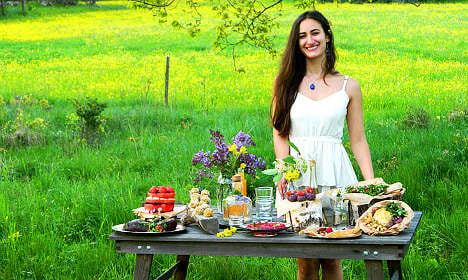Selina, 24, was born and raised in Sweden but has family in Lebanon and Syria. Deeply moved by reports of a worsening situation in Syria, she decided she wanted to help the people most in need. But how?
A daughter, her dad, and an online fundraiser
Her career path was off-kilter: after completing her studies in international relations in Stockholm and learning about aid organizations, Selina took the unexpected step of setting up a vegan catering company, Selina’s Organics.
“Food is where I merge my interest in cooking with my interest in connecting people,” she tells The Local.
On a visit to family members based in Beirut, she came up with the idea of putting together food packages for internally displaced refugees across the border in Syria. Her father encouraged her to go ahead with it and she posted the idea online.
Friends reacted very positively and soon she had received 24,000 kronor ($2,900) in donations.
“It was very emotional – I started crying”
In October 2015 the time was ripe: Selina and her dad drove from Beirut to Damascus.
“After driving into Syria we started hearing the sounds of bombing. I was in my dad’s car eating dates and when the smoke filled the sky – the sweetness of the dates turned into bitterness. I felt like reality had switched and now I was entering Syria’s reality – it was a weird feeling.”
In Damascus they pulled up at a grocery store and bought as much food as they could with the money Selina had raised.
They had soon filled boxes with enough rice, beans, pasta, salt and sugar to feed 123 families for up to four weeks. They distributed two tonnes of food on this first trip.
Local volunteers soon helped them find some of the most disadvantaged families in the Damascus suburbs, many of them headed by women who had lost their husbands to war and now had no source of income.
The families were asked to come to a designated address to receive the aid packages.
“It was very emotional to me when the families came to the room – I started crying.”
She stayed in Syria for almost a week, but she would soon be back again.

A grocer in Damascus. Photo: Private
Googled by the Dutch
A Dutch distributor of organic fruit and vegetables got wind of what Selina was doing. A month after her return to Sweden she received a call from the managing director.
“They wanted to do something for Syria, to help,” she recalls. “They wanted to fund me to make another trip and hand over more aid boxes.”
The company sent her €5,000. Selina quickly booked a ticket and headed to Syria again.
“This time I visited families in their homes. There were many poor families and others who were actually rich before the war – but the war impoverished them and their fridges were now empty.”
Selina says she was careful throughout to avoid any situations that could be seen to align her with any political party in Syria. So she declined to give aid to soldiers, for instance, and instead focused her attentions on civilians.
This time she gathered 6.5 tonnes of food, enough for 342 families.
“I counted it like that. If every family has three or four members, then we helped around 1,400 people.”
What it’s like to get used to war
As her visits grew more frequent Selina found she got used to the bombing and devastation.
But her encounters with local families retained their emotional charge.
“I met children and mothers. They cried and I cried – everyone cried,” she says. “They were just overwhelmed by the whole situation.”
But at the same time the Syrians she met were “filled with love, very polite.”
What she found perhaps most surprising was that people were still visiting restaurants and cafés and going about their lives almost as normal.
Back in Sweden, she has had time to reflect on the strange jumble of experiences and impressions, and the impact of her one-woman aid project.
“I think the key isn’t what I did. Not everyone might feel the urge to go to Syria and hand out food,” says Selina.
“The key is to show that everyone can do something that affects more than one person. Everyone can just do a very little part – that’s all we have to do.”

Photo: Private


 Please whitelist us to continue reading.
Please whitelist us to continue reading.